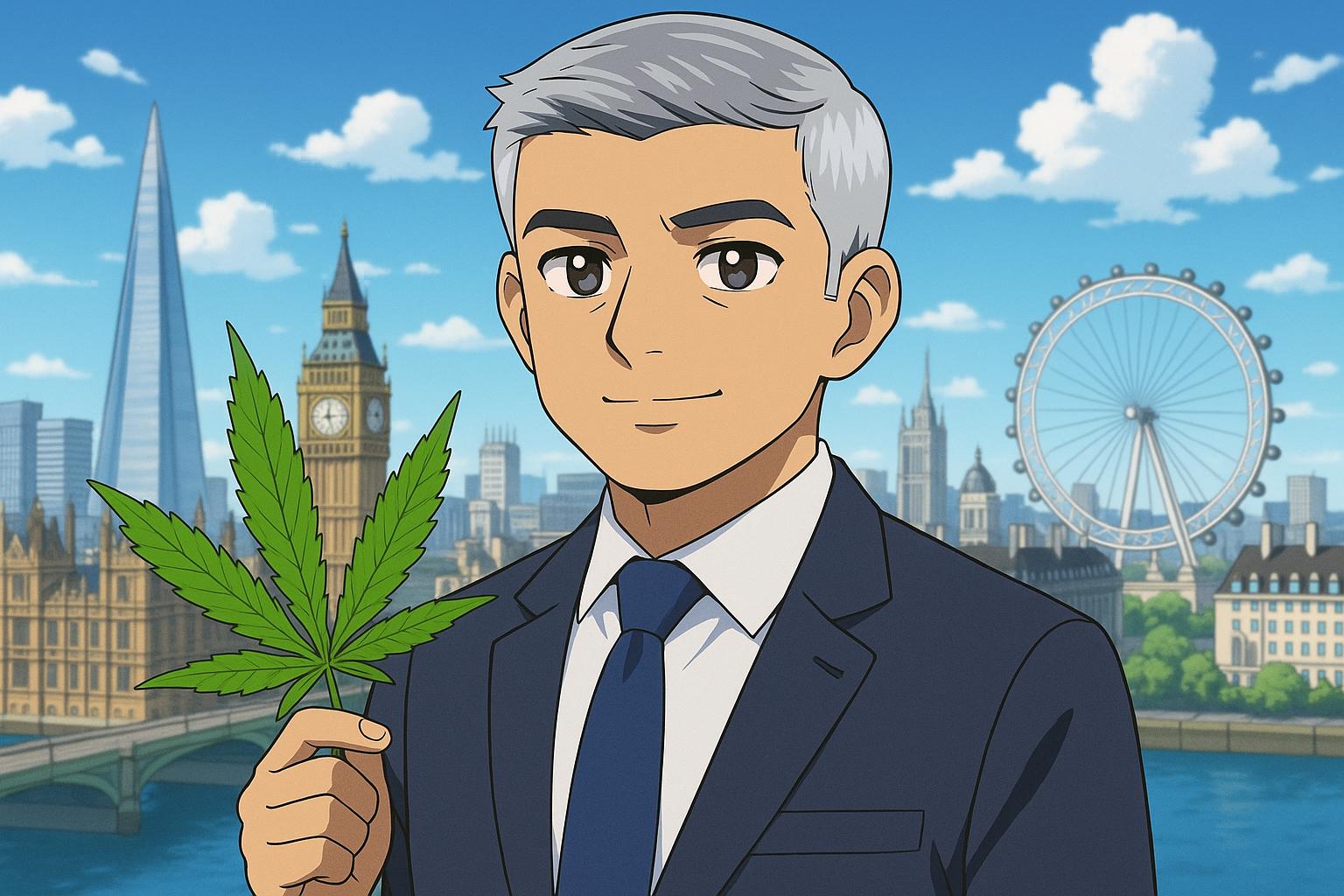London Mayor Sadiq Khan has urged the government to reconsider cannabis laws following a report recommending the reclassification of natural cannabis possession to reduce disproportionate criminalisation and improve public health outcomes, sparking debate across political lines.
London Mayor Sadiq Khan has made a bold endorsement for the decriminalisation of cannabis, asserting that current laws governing the drug are unjustifiable. This declaration follows the release of a report from the London Drugs Commission, which Khan had commissioned. He described the findings as providing “a compelling case” for reform and urged the government to reconsider its stance on cannabis legislation.
The London Drugs Commission, established in 2022 under Khan’s direction and chaired by Lord Charlie Falconer, conducted an extensive review of the existing drug laws. It highlighted that the current legal framework disproportionately affects specific ethnic communities and exacerbates tensions between these groups and law enforcement. The commission’s report does not advocate for full decriminalisation but suggests that the use of “natural” cannabis should shift from the Misuse of Drugs Act to the Psychoactive Substances Act. This shift would effectively legalise possession of small amounts for personal use while maintaining strict prohibitions against importing, manufacturing, or distributing the drug.
Khan’s push for reform follows a backdrop of evolving attitudes towards cannabis. The initiative aligns with similar movements observed in various jurisdictions, particularly in parts of the United States and Canada, where cannabis legalisation has been linked to reduced criminalisation of users and more effective public health outcomes. However, reactions to Khan’s proposal highlight a significant divide in public opinion. Shadow Home Secretary Chris Philp vehemently opposed the plans, warning that decriminalising possession of cannabis would turn London into a “crime-ridden ghetto.” He cited worrying trends from US and Canadian cities that have adopted more lenient drug policies, which he claims have led to increased anti-social behaviour and mental health issues.
Moreover, Khan’s administration has faced scrutiny from within its ranks regarding past initiatives aimed at diverting young people found with small quantities of cannabis from the criminal justice system. A pilot scheme proposed in 2022 to funnel these individuals towards educational and counselling services received criticism for lacking ambition. Critics argued that such measures did not sufficiently address the structural inequities perpetuated by existing drug laws, and echoed calls for a more comprehensive approach to decriminalisation.
The implications of Khan’s report extend beyond the immediate legal landscape; they touch upon broader societal issues, including public health, community relations, and the relationship between law enforcement and citizens. Advocates for drug reform argue that better education, healthcare, and equitable policing can create a safer and more just society. They contend that understanding cannabis use through a public health lens, rather than solely a criminal one, is a necessary evolution in policy.
Despite the support from Khan and the commission, the government has responded coolly, reiterating its commitment to maintaining cannabis as a Class B substance under the Misuse of Drugs Act. A Home Office spokesperson stated that efforts would be focused on driving down drug use through treatment and education, rather than legislative changes regarding cannabis classification.
As London navigates this contentious issue, the ongoing debate reflects broader trends in drug policy reform globally, posing significant questions about the future of drug legislation in the UK. With Khan at the helm advocating for shifts in public policy, London finds itself at a crossroads, balancing the need for public safety with the growing call for evidence-based reforms in drug legislation.
Reference Map:
- Paragraph 1 – [1], [2]
- Paragraph 2 – [1], [3], [6]
- Paragraph 3 – [4], [5]
- Paragraph 4 – [7]
- Paragraph 5 – [1], [2], [5]
Source: Noah Wire Services
- https://www.dailymail.co.uk/news/article-14755487/Cannabis-decriminalised-says-Londons-mayor.html?ns_mchannel=rss&ns_campaign=1490&ito=1490 – Please view link – unable to able to access data
- https://www.standard.co.uk/news/london/sadiq-khan-drug-commission-election-pledge-b961084.html – In April 2021, Sadiq Khan announced plans to establish a London Drugs Commission to examine the effectiveness of UK drug laws, particularly focusing on cannabis. The commission aims to assess the best methods to prevent drug use, the most effective criminal justice responses, and the public health benefits of different approaches. This initiative was part of Khan’s manifesto during his re-election campaign, reflecting his commitment to addressing drug-related issues in London through evidence-based strategies.
- https://www.theguardian.com/society/2022/may/12/sadiq-khan-launches-commission-to-examine-cannabis-legality – In May 2022, Sadiq Khan launched the London Drugs Commission, chaired by Lord Charlie Falconer, to examine the effectiveness of UK drug laws, with a particular focus on cannabis. The commission comprises independent experts from various fields, including criminal justice, public health, politics, community relations, and academia. Its objective is to consider evidence from around the world on the outcomes of various drug policies and make policy recommendations to improve the situation for Londoners.
- https://www.theguardian.com/society/2022/jan/04/sadiq-khan-plans-pilot-to-decriminalise-minor-cannabis-offences – In January 2022, Sadiq Khan proposed a pilot scheme in three London boroughs—Lewisham, Greenwich, and Bexley—to divert young people found with small amounts of cannabis away from arrest and towards education or counselling services. This initiative aimed to reduce reoffending and address the disproportionate impact of drug laws on certain communities. The plan faced opposition from Downing Street and Labour leader Keir Starmer, who expressed concerns about decriminalising drugs.
- https://www.standard.co.uk/news/london/sadiq-khan-drugs-cannabis-decriminalisation-b975085.html – In January 2022, experts criticised Sadiq Khan’s proposed pilot scheme to divert young people found with small amounts of cannabis in three London boroughs away from arrest and towards education or counselling services. While the initiative aimed to reduce reoffending, experts argued that it did not go far enough and called for a more ambitious approach to drug decriminalisation. The proposal faced opposition from Downing Street and Labour leader Keir Starmer, who opposed changes to drug laws.
- https://www.standard.co.uk/news/world/sadiq-khan-drugs-tsar-legalising-cannabis-london-b999510.html – In May 2022, Sadiq Khan appointed Lord Falconer to lead a review of UK drug laws, focusing on cannabis, as part of his manifesto pledge during his re-election campaign. The London Drugs Commission aims to examine the effectiveness of current drug laws and explore the potential benefits of legalising cannabis. This initiative reflects Khan’s commitment to addressing drug-related issues in London through evidence-based strategies.
- https://www.london.gov.uk/who-we-are/what-london-assembly-does/questions-mayor/find-an-answer/legalising-drugs-london – In August 2024, during a London Assembly meeting, Sadiq Khan addressed questions regarding the legalisation of drugs in London. He emphasised the need for a robust evidence base to inform policymaking on this issue and highlighted the establishment of the London Drugs Commission to review evidence related to cannabis laws and their impacts in the UK. Khan stated that the commission is only considering evidence around cannabis and no other substance.
Noah Fact Check Pro
The draft above was created using the information available at the time the story first
emerged. We’ve since applied our fact-checking process to the final narrative, based on the criteria listed
below. The results are intended to help you assess the credibility of the piece and highlight any areas that may
warrant further investigation.
Freshness check
Score:
6
Notes:
 The narrative presents recent developments regarding Sadiq Khan’s endorsement of cannabis decriminalisation and the London Drugs Commission’s report. However, similar discussions have been reported since 2022, with the earliest known publication in January 2022. ([theguardian.com](https://www.theguardian.com/society/2022/jan/04/sadiq-khan-plans-pilot-to-decriminalise-minor-cannabis-offences?utm_source=openai)) The report’s findings and Khan’s stance have been covered in various outlets, indicating that the core information is not entirely new. The presence of a press release suggests a higher freshness score, but the recycled nature of the content warrants a moderate score.
The narrative presents recent developments regarding Sadiq Khan’s endorsement of cannabis decriminalisation and the London Drugs Commission’s report. However, similar discussions have been reported since 2022, with the earliest known publication in January 2022. ([theguardian.com](https://www.theguardian.com/society/2022/jan/04/sadiq-khan-plans-pilot-to-decriminalise-minor-cannabis-offences?utm_source=openai)) The report’s findings and Khan’s stance have been covered in various outlets, indicating that the core information is not entirely new. The presence of a press release suggests a higher freshness score, but the recycled nature of the content warrants a moderate score.
Quotes check
Score:
7
Notes:
 The quotes attributed to Sadiq Khan and other officials appear to be consistent with previous statements made in 2022. For instance, Khan’s comments on the need for a debate on drug laws and the establishment of the London Drugs Commission align with his earlier remarks. The consistency of these quotes suggests that they are not newly sourced, but rather recycled from earlier reports.
The quotes attributed to Sadiq Khan and other officials appear to be consistent with previous statements made in 2022. For instance, Khan’s comments on the need for a debate on drug laws and the establishment of the London Drugs Commission align with his earlier remarks. The consistency of these quotes suggests that they are not newly sourced, but rather recycled from earlier reports.
Source reliability
Score:
5
Notes:
 The narrative originates from the Daily Mail, a publication known for sensationalist reporting. While it references statements from reputable figures like Sadiq Khan and Lord Charlie Falconer, the Daily Mail’s history of sensationalism raises concerns about the reliability of the report. The presence of a press release may indicate some level of authenticity, but the source’s reputation necessitates caution.
The narrative originates from the Daily Mail, a publication known for sensationalist reporting. While it references statements from reputable figures like Sadiq Khan and Lord Charlie Falconer, the Daily Mail’s history of sensationalism raises concerns about the reliability of the report. The presence of a press release may indicate some level of authenticity, but the source’s reputation necessitates caution.
Plausability check
Score:
8
Notes:
 The claims regarding Sadiq Khan’s endorsement of cannabis decriminalisation and the findings of the London Drugs Commission are plausible and consistent with previous reports from 2022. The narrative aligns with known facts and does not introduce any new, unverified information. The tone and language used are consistent with typical reporting on this topic, further supporting the narrative’s plausibility.
The claims regarding Sadiq Khan’s endorsement of cannabis decriminalisation and the findings of the London Drugs Commission are plausible and consistent with previous reports from 2022. The narrative aligns with known facts and does not introduce any new, unverified information. The tone and language used are consistent with typical reporting on this topic, further supporting the narrative’s plausibility.
Overall assessment
Verdict (FAIL, OPEN, PASS): FAIL
Confidence (LOW, MEDIUM, HIGH): MEDIUM
Summary:
 The narrative largely recycles information from earlier reports, with similar content appearing since January 2022. The quotes attributed to officials are consistent with previous statements, indicating a lack of new information. The source’s reliability is questionable due to the Daily Mail’s history of sensationalism. While the claims are plausible, the recycled nature of the content and the questionable source reliability lead to a ‘FAIL’ verdict with medium confidence.
The narrative largely recycles information from earlier reports, with similar content appearing since January 2022. The quotes attributed to officials are consistent with previous statements, indicating a lack of new information. The source’s reliability is questionable due to the Daily Mail’s history of sensationalism. While the claims are plausible, the recycled nature of the content and the questionable source reliability lead to a ‘FAIL’ verdict with medium confidence.













